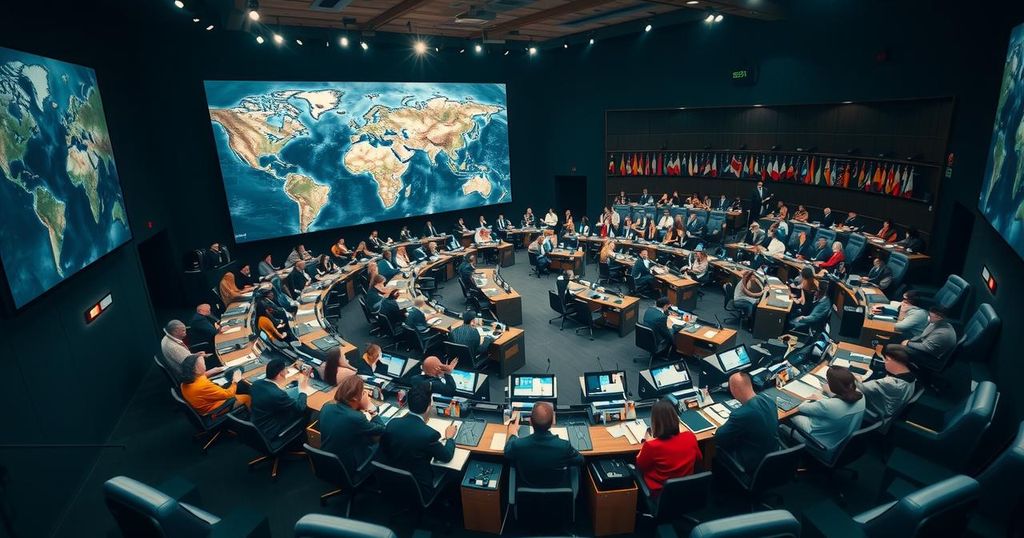Urgent Action Required: Nations Must Address Emissions Gap to Save 1.5°C Climate Target
The UNEP’s Emissions Gap Report 2024 calls for nations to cut greenhouse gas emissions by 42% by 2030 and 57% by 2035 to stay on track with the Paris Agreement’s 1.5°C target. Without increased ambitions in upcoming Nationally Determined Contributions (NDCs), global warming could rise between 2.6°C and 3.1°C, creating dire consequences. The report emphasizes the necessity for immediate action and highlights the potential for significant reductions through renewable energy and enhanced cooperation among countries, particularly G20 members.
Nations are faced with the urgent requirement to collectively reduce greenhouse gas emissions by 42% by 2030 and 57% by 2035 as outlined in the recent United Nations Environment Programme (UNEP) report. This report, titled “Emissions Gap Report 2024: No more hot air … please!”, emphasizes that failure to adopt heightened ambitions in the upcoming Nationally Determined Contributions (NDCs) may jeopardize the Paris Agreement’s emblematic goal of limiting global warming to 1.5°C within mere years. With updated NDCs expected next year ahead of the COP30 climate talks in Brazil, the UNEP analysis estimates that without immediate action, global temperatures could rise by 2.6°C to 3.1°C this century, resulting in catastrophic consequences for both humanity and the environment. The insights from the report underscore a grim scenario where the full execution of existing unconditional and conditional NDCs leads to an approximate rise of 2.8°C, ultimately escalating to 3.1°C should current policies remain unchanged. In contrast, integrating additional net-zero commitments could moderate warming to about 1.9°C, though skepticism persists regarding the realization of such pledges. UN Secretary-General António Guterres elucidated, “The emissions gap is not an abstract notion. There is a direct link between increasing emissions and increasingly frequent and intense climate disasters.” With emissions having surged to an unprecedented level of 57.1 gigatons of carbon dioxide in 2023, immediate responses are necessitated to curtail an annual average of 7.5% reductions needed for 1.5°C stability. To limit warming to below 2°C demands an approximate 28% emission reduction by 2030, tied to fresh milestones commencing in 2035. The report stresses the technical viability of substantial emissions reductions—potentially reaching 31 gigatons in 2030 and 41 gigatons in 2035—largely through the expanded implementation of solar and wind technologies, which together could yield significant reductions by addressing energy use across various sectors. Nevertheless, realization of these ambitious goals hinges on unparalleled global cooperation, innovative financing structures, and robust environmental policies. To achieve net-zero targets, the report estimates a necessity for a six-fold increase in mitigation investment, comparable to a range of US$0.9 trillion to $2.1 trillion annually through 2050, which remains economically feasible given the context of current global economic values. The G20 nations, collectively responsible for a substantial portion of global emissions, must spearhead these initiatives, enhancing their respective pledges significantly to bridge the emissions gap effectively. In conclusion, to avert a drastic rise in global temperatures and consequent disaster, it is imperative for nations to intensify their commitments to emission reductions, supported by a concerted global mobilization. Effective NDC design will feature prominently, encompassing comprehensive strategies that dovetail climate and developmental objectives while fostering international support for emerging economies and ensuring transparency and accountability in climate commitments.
The report discusses the significant obligations that countries have under the Paris Agreement to combat climate change, particularly emphasizing the critical need for updated Nationally Determined Contributions (NDCs) to align with the warming limits set by the agreement. It highlights historical emission trends and the stark contrast between current trajectories versus the required reductions, reinforcing the urgency for immediate and decisive action against climate change to avoid irreversible damage and severe calamities. The implications of the report’s findings are vital in informing global climate negotiations, particularly in the lead-up to COP30 in Brazil.
In summary, the UNEP’s Emissions Gap Report 2024 outlines an urgent demand for nations to enhance their emissions reduction pledges to avoid catastrophic climate outcomes. With the 1.5°C target at risk, immediate collective action is necessary, necessitating robust commitments from key global players, particularly G20 nations. The report underscores the capacity for significant emissions reductions through technological advancements and the critical need for comprehensive national strategies to achieve sustainable development alongside climate goals.
Original Source: phys.org




Post Comment